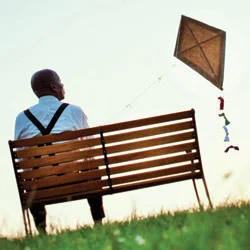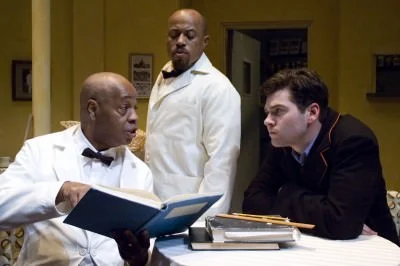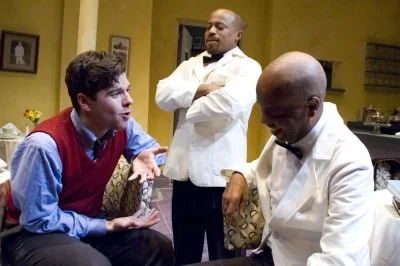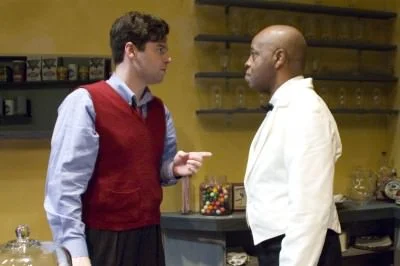Master Harold’ … and the Boys

Directed by Jonathan Wilson, SDC
At Timeline Theatre
“The truth? I seem to be the only one around here who is prepared to face it. We’ve had the pretty dream, it’s time now to wake up and have a good long look at the way things really are.”
—Hally, “Master Harold” …and the boys
Wonderful language fuels Fugard’s tale of hope and despair in South Africa during apartheid.
As part of a three play year of Athol Fugard plays, Timeline Theatre presents Master Harold and the Boys (Remy Bumppo has Fugard’s The Island and Court Theatre will present Sizwe banzi is Dead). Master Harold is the story of a white teenage boy and his only two friends, Sam and Willie, adult black employees of the family restaurant. Master Harold …and the Boys was written in 1982 as both a coming-of-age drama and an attack on racism. This is a wrenching story about an impossible yet real friendship in South Africa in 1950.

We meet Sam (Alfred H. Wilson) and Willie (Daniel Bryant), waiters in a tea shop (fabulous set design by Timothy Mann) in Port Elizabeth, South Africa. The two are discussing the upcoming ballroom dance contest as Sam both kids Willie about his dance technique and his choice of partners. Enter Harold, aka “Hally” (Nate Burger) the 17 year old son of the owners. We learn that Hally, Sam and Willie are affectionately connected since Hally was a child. Sam was more of a father figure than Hally’s real father.

When Hally learns that his drunken father is coming home from the hospital, Hally denies that possibility. Hally plunges into his home work with Sam commenting and learning what Hally is learning like they have been doing for years. We realize Sam and Willie were friends, companions and confidants of the boy. The boy taught the adults from his school books yet the white boy was the master and the black adults were servants. These reminisce demonstrated the warmth and love among the three.

When Hally became disturbed by the phone calls announcing his father was leaving the hospital he would vent his anger by ordering Sam and Willie to “get to work.” Then he would cool down and his fond memory of how Sam built a kite and taught the boy how to fly it. The discussion turned to ballroom dancing and Hally thought that would make for an interesting topic for his school essay. Fugard uses the metaphor of ballroom dancing for a world in which apartheid has forces and people bumping into each other like dancers on the ballroom floor.
When yet another phone call has Hally’s father at home, he can’t hold back his rage at his drunken invalid father. He again takes it frustration out on the only two people he has any control over—Sam and Willie. Hally rage is full of racist jokes, insulting and condescending personal insults and humiliating orders toward Willie and, most of all, Sam. The more Sam tries to council the boy, the more Hally’s deep seeded racism emerges. Hally crosses the line and the relationship is forever changed. Fugard makes a dramatically powerful statement that every relationship and memory is affected by political and social attitudes in which it exists.
Nate Burger, while at first appearing a tad too old to be 17, possesses enough boyish charm to be credible. He demonstrates an excellent white South African/British accent and the intense emotional range to make Hally both likeable and a product of his time. Burger’s emotional breakdown was quite moving. Daniel Bryant, as Willie, nicely supported and underscored Sam’s encounters with the boy.
Alfred H. Wilson was outstanding as the charismatic Sam. Wilson exudes the strength and dignity of a man at peace with himself. We feel his warmth, wit and genuine friendliness toward the boy and we also feel his pain,humiliation and rage when Hally berates him. Wilson and Burger’s interactions were truthful and convincing especially in the scenes about Sam building a kite for Hally.
Fugard’s play puts a face on apartheid and suggests that weakness and need to control others is at the source of racism. He shows us that once trapped in that scenario, few realize that change is possible. Hally doesn’t realize the consequences of his behavior toward Sam and Willie. He attacks Sam because he can’t attack his father.
This is a moving work that everyone should see as a reminder about injustice. The power of friendship and the destructive nature of institutional racism collide as Fugard puts a face on it in this landmark work. Master Harold and the Boys is a reminder to us that we still have work to do. Kudos to Timeline Theatre for mounting Fugard’s most autobiographical work. The performances due justice to the work’s powerful message.
Highly Recommended
Tom Williams
At Timeline Theatre, 614 W. Wellington, Chicago, IL, call 773-281-8463, www.timelinetheatre.com, Wednesdays & Thursdays at 7:30 pm, Fridays at 8 pm, Saturdays at 4 & 8 pm, Sundays at 2 pm, running time is 1 hour, 35 minutes without intermission.
